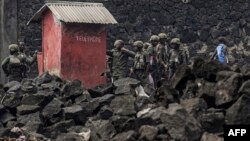In early January, the Rwanda-supported M23 rebel military group attacked and then over-ran Goma, the capital city of North Kivu province in the Democratic Republic of the Congo, as well as several smaller towns. As they moved through this city of two million people and advanced rapidly toward South Kivu, M23 troops faced no opposition. Nonetheless, the bodies piled up and violence escalated. The United Nations estimates that around 900 people were killed and thousands more injured.
On February 3, Foreign Ministers of the United States and its G-7 partners, Canada, France, Germany, Italy, Japan, the United Kingdom, and the EU, released a joint statement condemning the escalation of violence in the Eastern DRC and calling for negotiations between the warring countries.
“We … strongly condemn the Rwanda-backed M23 offensive in the eastern Democratic Republic of the Congo, and in particular, the capture of Minova, Saké and Goma. We urge M23 and the Rwanda Defense Force to cease their offensive in all directions. We call for the urgent protection of civilians,” said the statement.
“We also call for an end to all direct and indirect support to the M23 and all non-state armed groups in the DRC. This offensive constitutes a flagrant disregard for the sovereignty and territorial integrity of the DRC,” said the statement.
The G-7 ministers also called for the rapid, safe and unimpeded passage of humanitarian relief for civilians and reiterated that humanitarian personnel must be provided assurances of safety.
One day after the release of the G-7 joint statement, the Rwanda-backed M23 forces announced a pause in their advance of eastern DRC for humanitarian reasons.
It’s a start, but much more needs to be done.
The G-7 statement urges all parties to fully commit to a peaceful and negotiated resolution of the conflict and for the M23 to withdraw from all areas under their control. Most importantly, it calls on all parties to return to the negotiating table, and to honor their commitments under the Luanda Process, a mechanism to aid peace efforts that is today viewed as a baseline for peace accords in Africa.
“We reiterate our full support to the United Nations Organization Stabilization Mission in the DRC to protect civilians and stabilize the region,” said the statement, “and call on all parties to respect its mandate.”






